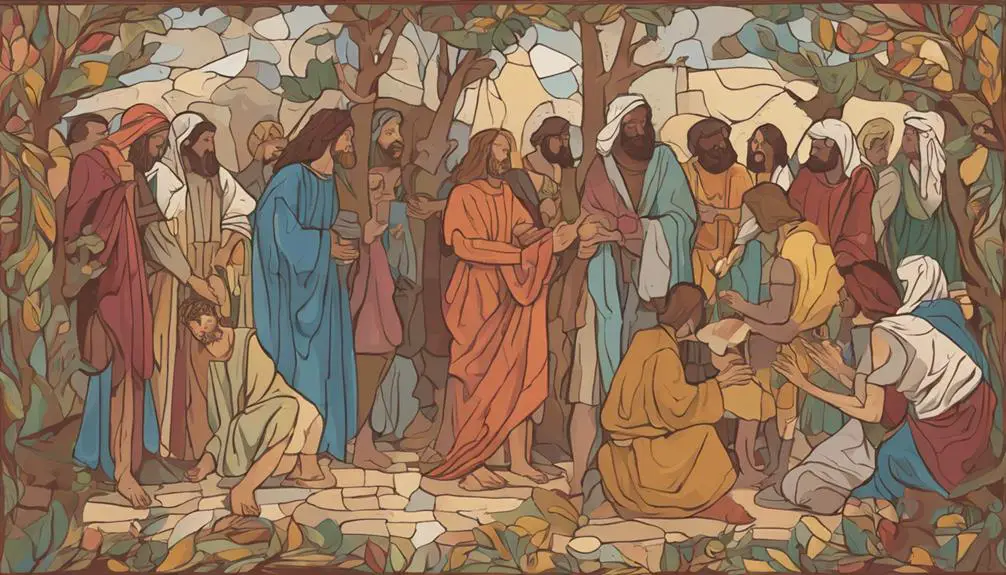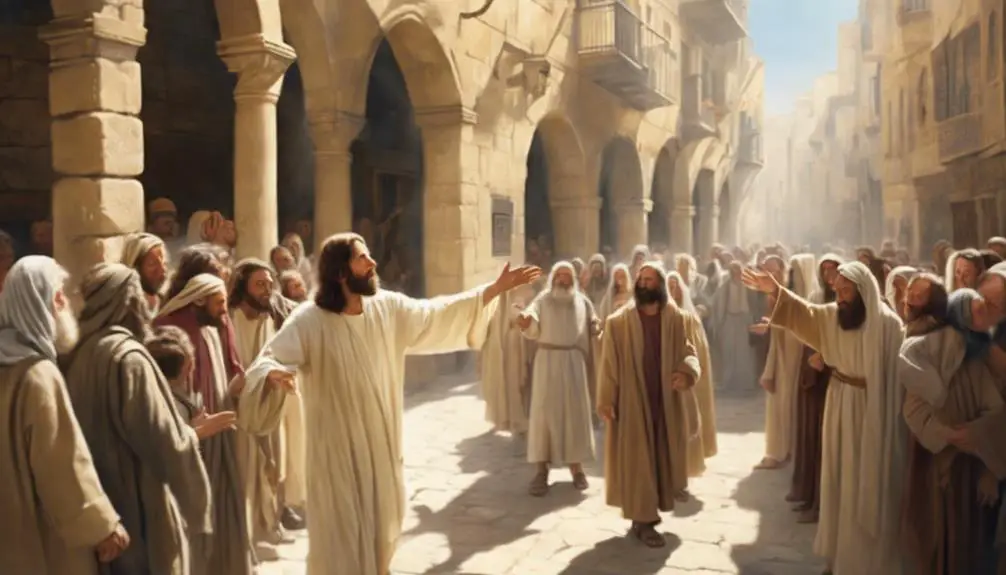Ponder the pivotal encounters with Jesus in the Bible and discover how they can shape your life's journey today.

Encounters With Jesus in the Bible
Isn't it fascinating how often you stumble upon biblical narratives of ordinary individuals meeting Jesus during His time on earth?
You're about to explore these encounters further, focusing on how they shaped the lives of people like fishermen, a Samaritan woman, a tax collector, and even a notorious sinner turned follower.
Their stories, filled with transformative moments and profound teachings, are waiting to stir thoughtful discussion.
But, are you ready to embark on this journey, questioning what these encounters might mean for you?
Key Takeaways
- Faith in Jesus leads to transformative experiences and miraculous interventions, as demonstrated by the fishermen disciples, Blind Bartimaeus, and Mary Magdalene.
- Jesus's interactions with the Samaritan woman and Zacchaeus challenge societal norms, emphasizing inclusivity and acceptance regardless of social status.
- Personal encounters with Jesus inspire individuals such as the Samaritan woman and Mary Magdalene to lead others towards faith.
- Encounters with Jesus result in radical life changes and repentance, shown by Zacchaeus and Mary Magdalene's profound transformations.
Jesus and the Fishermen Disciples

Delving into the narrative of 'Jesus and the Fishermen Disciples', we encounter an extraordinary instance of Jesus's charisma and divine authority as he calls forth the unsuspecting fishermen to be his disciples. This narrative speaks volumes about the Fishermen's Faith and the process of Calling Disciples, both integral aspects of the Christian tradition.
You see, the fishermen, Simon Peter, Andrew, James, and John, weren't just chosen randomly. Their profession required patience, perseverance, and faith – qualities that Jesus deemed necessary for those who'd follow him. Upon encountering Jesus, they were asked to leave behind their familiar lives. Yet, without hesitation, they left their nets, embodying an instant yet profound faith in Jesus's words.
Their calling signifies Jesus's inclusive approach, valuing faith and willingness over social status or knowledge. It also showcases his divine authority, as his mere words could compel these men to abandon their livelihoods.
Analyzing further, it's evident that their faith was transformative. It not only allowed them to witness Jesus's miracles firsthand but also empowered them to perform miracles themselves, signifying the transformative power of faith when aligned with divine calling.
In essence, the narrative of 'Jesus and the Fishermen Disciples' profoundly illustrates the dynamics of faith, divine calling, and discipleship.
The Samaritan Woman's Story

Turning our attention to the Samaritan woman's story, we find another compelling encounter that underscores Jesus's disregard for social barriers and his transformative influence on individuals. This narrative, found in John 4:1-42, challenges the rigid cultural boundaries of the time. He, a Jew, initiates a conversation with a Samaritan woman, an act that was culturally inappropriate and viewed as scandalous due to the existing enmity between Jews and Samaritans.
Jesus's approach is noteworthy. He doesn't condemn her but rather, reveals her life truthfully and offers her living water, a metaphor for the spiritual transformation that comes with believing in him. His encounter with the Samaritan woman extends beyond the personal realm; it has broader implications for the community. Influenced by Jesus's words, the woman becomes a witness, leading many Samaritans to believe in Jesus.
The Samaritan woman's story is a vivid illustration of Jesus's capacity to cross cultural boundaries and transform lives. It serves as a powerful testament to his mission, which wasn't confined by societal norms but was a beacon of hope and change for all, regardless of their cultural or social standing.
Healing of the Blind Bartimaeus

In the biblical tale of the healing of Blind Bartimaeus, you witness another profound encounter with Jesus, showcasing his deep compassion and miraculous healing power. This narrative, found in Mark 10:46-52, provides a vivid illustration of the transformative power of faith and the miraculous intervention of Jesus.
Bartimaeus, a blind beggar, hears of Jesus' presence and calls out to him, displaying an unwavering faith in Jesus' ability to restore his sight. The crowd rebukes him, yet he perseveres, his cries growing louder. His determination, coupled with his faith, captures Jesus' attention. Despite societal norms that marginalized him, Bartimaeus boldly declares his belief, asserting his faith in the face of adversity.
The miracle interpretation of this encounter emphasizes the role of an individual's faith in eliciting divine intervention. Jesus states, 'Your faith has healed you,' thereby acknowledging Bartimaeus' faith as the catalyst for his healing. This encounter underscores the transformative potential of faith in the divine, demonstrating that sincere belief can lead to miraculous interventions.
This analysis of Bartimaeus' faith and the miracle interpretation provides a deeper understanding of this encounter. It underlines the profound compassion of Jesus and the potential of unwavering faith to catalyze miracles.
Zacchaeus, the Repentant Tax Collector

Another intriguing encounter with Jesus in the Bible involves Zacchaeus, a tax collector notorious for his dishonest practices, whose life dramatically changes after meeting Jesus. This remarkable story unfolds in Luke 19, presenting a profound Tax Collector's Transformation, often overlooked in biblical analysis.
Zacchaeus, despised by many for his corruption, yearns to see Jesus. Overcoming physical limitation and social ridicule, he climbs a sycamore tree for a clear view. Jesus, noticing Zacchaeus, invites Himself to his house, sparking outrage among the crowd who sees Zacchaeus as a sinner.
However, in the face of criticism, Zacchaeus's Redemption emerges. He pledges to give half of his possessions to the poor and to restore fourfold any amount he's defrauded. This dramatic decision, kindled by his encounter with Jesus, represents a radical shift from his previous life of deceit. Moreover, Jesus's response to Zacchaeus's audacious commitment underscores the core of His mission – to seek and save the lost.
Mary Magdalene: From Sinner to Follower

Just as Zacchaeus's life was dramatically altered by his encounter with Jesus, so too was that of Mary Magdalene, whose journey from sinner to devout follower offers a compelling narrative of transformation and redemption. Her story is one of profound change, epitomizing the concept of Magdalene's Transformation through Jesus' Forgiveness.
Mary Magdalene's life before encountering Jesus was marked by sin and misery. However, her encounter with Jesus brought about a radical change. Consider the following:
- Jesus cast out seven demons from Mary, marking the beginning of her transformation.
- Mary became a fervent follower of Jesus, accompanying him and his disciples.
- She witnessed Jesus' crucifixion and resurrection, demonstrating her unwavering faith.
- Mary was the first to see the resurrected Jesus, highlighting her special status among his followers.
- Despite her past, Jesus' forgiveness enabled Mary to become a key figure in Christianity.
In essence, Mary Magdalene's transformation underscores Jesus' inclusive love and power to redeem. Her story is a testament to the transformative effect of Jesus' forgiveness, serving as an inspiration for all who struggle with their past. It's a vivid reminder that no one is beyond the reach of God's mercy and grace.
Frequently Asked Questions
What Were the Common Societal Attitudes Towards Jesus During His Time?"
During Jesus's time, societal attitudes towards him were complex. You'll find that he faced significant societal rejection. Many viewed him as a threat, leading to Jesus's persecution.
His radical teachings contradicted established norms, causing discomfort and fear among the populace and leaders. However, not all rejected him. Some saw hope and salvation in his message, creating a divide in society's perception of this influential figure.
How Did Jesus's Teachings Influence the Political Landscape of His Era?"
Jesus's teachings, advocating love and equality, posed a form of political resistance to the established order. You'd notice that his message challenged the status quo, encouraging a shift in societal norms and power structures.
Many, adopting these teachings, began questioning and challenging their leaders. This erosion of traditional authority significantly influenced the political landscape, leading to considerable tension and conflict.
Thus, Jesus's teachings had a profound impact on the political dynamics of his time.
In What Ways Did Jesus's Encounters With Individuals Differ From His Interactions With Groups?"
When Jesus interacted with individuals, he focused on personal salvation and divine forgiveness. His one-on-one encounters often involved healing or forgiveness of sins.
In contrast, his group interactions were more about spreading his message and teachings. He used parables to speak to the masses, while individual encounters were more intimate and personal.
How Did Jesus's Miracles Impact the Religious Beliefs of Non-Followers?"
Jesus's miracles often startled non-believers, shaking their religious convictions. You'd see these miraculous interpretations as a challenge to rational thought, yet captivating. They'd create a stir, piquing curiosity and causing you to question your beliefs.
Non-believer reactions varied, some dismissed them as tricks, while others were drawn to the profound mystery. You might be sceptical, but you'd find yourself pondering the possibility of a divine power.
Jesus's miracles certainly had the power to disturb the religious status quo.
What Are the Historical Evidences Supporting the Biblical Encounters of Jesus?"
When seeking historical evidence supporting biblical encounters of Jesus, you'll find archaeological discoveries and historical manuscripts quite revealing. Ancient letters, like those of Paul, provide eyewitness accounts.
Archaeological sites corroborate biblical narratives, strengthening their believability. You're not just relying on faith, but tangible, scrutinized evidence.
It's a compelling combination of faith and facts that deepens the understanding of these encounters.
Conclusion
In sum, you've journeyed through impactful encounters Jesus had with various individuals. These stories, featuring fishermen turned disciples, a Samaritan woman, a blind man, a repentant tax collector, and a transformed sinner, demonstrate Jesus's undeniable influence and transformative power.
Whether through unconditional love, healing, or forgiveness, Jesus's interactions left an indelible mark, encouraging personal growth and spiritual enlightenment.
Such encounters inspire you to evaluate your own spiritual journey and potential transformations.



Sign up